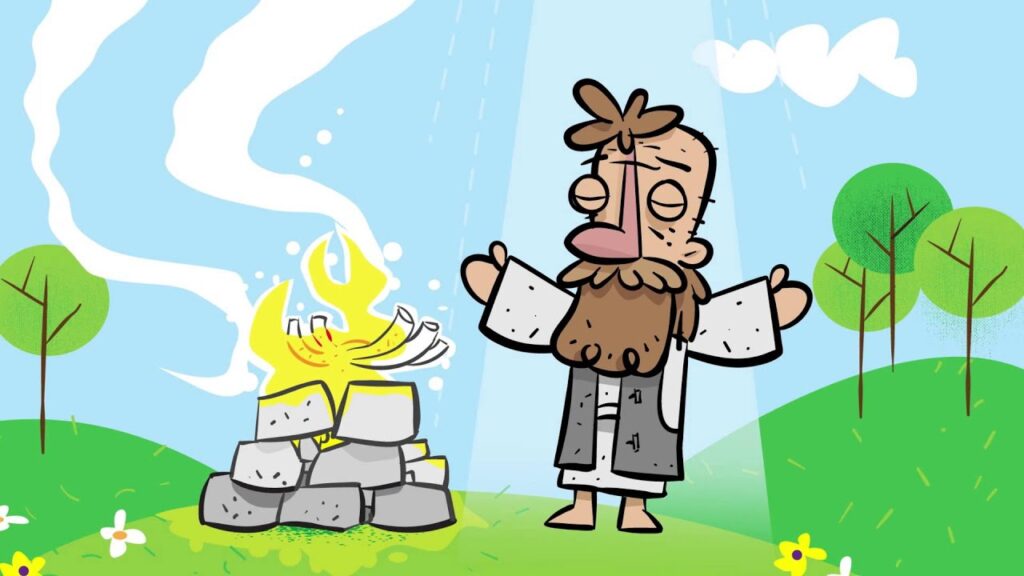In the story of Noah’s Integrity (Genesis 8-9), Noah exemplifies unwavering faith and righteousness, earning himself a place in the Faithful Hall of Fame mentioned in Hebrews 11. After surviving the great flood with his family and the animals, Noah built an altar and offered a sacrifice to God. This act of devotion pleased the Lord, who then made a solemn promise to Noah.
God vowed never to destroy the Earth and its inhabitants with a flood again, symbolized by a rainbow in the sky as a perpetual reminder of this covenant. This heartwarming narrative highlights the significance of faithfulness and integrity, showcasing Noah as a noble figure who earned divine favor through his virtuous actions.

Noah’s Legacy in the Bible
Introduction to Noah
Welcome to the fascinating exploration of Noah’s incredible legacy in the Bible! Noah is one of those figures who stands out not just for his remarkable actions, but for his profound faith and obedience to God. Imagine a world steeped in corruption and wickedness, where one man remains steadfast in his righteousness. That’s Noah for you. He lived in a time when humanity had strayed far from divine commandments, yet he found favor in God’s eyes. This divine favor led Noah to undertake a monumental task: building an ark to save his family and animal species from a devastating flood. His story, predominantly captured in Genesis chapters 8-9, is a tale of resilience, faith, and divine promises.
Overview of Genesis Chapters 8-9
Genesis chapters 8 and 9 offer a detailed account of the aftermath of the catastrophic flood that reshaped the earth. These chapters transition from the flood’s chaos to the restoration and renewal of life on earth. They highlight pivotal moments such as the receding of the waters, Noah’s exit from the ark, his act of worship through sacrifice, and the establishment of God’s covenant with Noah. You’ll encounter the first appearance of the symbolic rainbow, a divine sign of hope and God’s promise.
The Aftermath of the Flood
Receding Waters
Imagine being cooped up inside an ark for over a year with your family and countless animals. It must have been quite the ordeal! But at long last, the waters began to recede. This was no small feat; it was the first sign of hope after what must have felt like an eternity. Over a period, the water levels dropped, the ark rested on the mountains of Ararat, and the peaks of other mountains became visible. Sending out a raven and then a dove, Noah awaited reassurance of dry land. When the dove returned with an olive leaf, it was a sure sign that life was returning to the earth. Noah knew it was almost time to disembark.
Noah’s Exit from the Ark
Stepping out from the ark must have felt like stepping into a brand new world. Picture the relief and wonder Noah and his family felt. No longer hemmed in by wooden walls, they were greeted by open skies and the scent of fresh air. Noah, ever the faithful servant, wasn’t just about to go back to life as usual. He realized the significance of this moment and knew the first act upon leaving the ark should be to honor the Creator who had spared them. This transition from a confined space to a renewed world marked the beginning of a new chapter for humanity.
Noah’s Altar and Sacrifice
Building the Altar
What’s the first thing you would do after surviving a global catastrophe? For Noah, the answer was clear: worship. Noah recognized that their survival was nothing short of a miracle and wanted to thank God in a meaningful way. So, he gathered stones and built an altar. In this act of building the altar, Noah was setting an important precedent – acknowledging God and giving thanks before all else.
Sacrificial Offerings to God
Once the altar was built, Noah offered sacrifices to God. These were burnt offerings, symbolizing dedication and gratitude. Imagine the smoky aroma rising up, a tangible sign of Noah’s faith and thankfulness. God was deeply pleased with the sacrifice. In response, God made a promise to Noah, assuring him that He would never again curse the ground because of humans or destroy every living creature as He had done. This act of sacrifice wasn’t merely about following ritual; it was a deep, heartfelt expression of worship and submission to God’s will.
God’s Covenant with Noah
The Promise to Never Flood the Earth Again
God’s covenant with Noah is one of the most profound moments in the Bible. God promised that He would never again bring such a flood to destroy all life. This wasn’t just a verbal promise; it was a covenant, a binding agreement that marked a significant shift in God’s relationship with humanity. Noah’s faith and obedience had moved the heart of God to grant this promise. Imagine the comfort and reassurance that came with this divine commitment, especially after witnessing such devastating destruction.
The Symbolism of the Rainbow
As a sign of this everlasting covenant, God placed a rainbow in the sky. The rainbow became a divine symbol, a physical reminder of God’s promise and His mercy. Whenever you see a rainbow, remember its origin – a beautiful spectrum of colors arching across the sky, symbolizing hope and God’s unyielding promise. For Noah and his descendants, the rainbow would forever be a reminder that God’s mercy triumphs over judgment.
Significance of the Rainbow
A Sign of Hope and Preservation
The rainbow isn’t just a pretty arc of colors; it’s packed with meaning. Every time a rainbow appears, it stands as a testament to God’s promise to preserve life. It’s a sign that even in the face of storms, there is hope and renewal on the horizon. The rainbow encapsulates the essence of hope, reminding you that no matter how dark or challenging life may get, divine assurance is always present.
Theological Implications
Theologically speaking, the rainbow serves as a profound symbol of God’s grace and mercy. It represents a covenant that even divine wrath has boundaries. The rainbow signifies that God’s promises are reliable and that His mercy is an integral part of His relationship with humanity. It’s a symbol that calls for trust in God’s plans and His ultimate goodness, urging you to walk in faith even when you cannot see the entire picture.
Noah’s Integrity and Faith
Obedience to God
Noah’s story is fundamentally about obedience. When instructed to build an ark, even though there was no sign of impending disaster, Noah obeyed without question. Think about that level of faith and commitment. In a world that was indifferent or even hostile to righteousness, Noah stood firm in following God’s commands. His obedience was a testament to his unwavering faith and integrity.
Faith Despite Adversity
Noah exemplified faith in the face of overwhelming adversity. Building an ark wasn’t easy, and it certainly wasn’t popular. He probably faced ridicule and disbelief from the people around him, yet he pressed on. His faith wasn’t shaken by societal norms or public opinion. By maintaining his commitment to God’s instructions, Noah demonstrated a rare and admirable integrity, inspiring millions who would read his story in the years to come.
Lessons from Noah’s Story
Faithfulness and Obedience
Noah’s life teaches powerful lessons about faithfulness and obedience. His story illuminates that true faith isn’t just about belief but also about action. Noah didn’t just believe in God’s warnings; he acted on them, painstakingly building an ark and gathering animals as instructed. This faith in action serves as a powerful lesson that genuine belief in God will always manifest itself through obedience to His commands.
Repentance and Renewal
Another key lesson from Noah’s story is the theme of repentance and renewal. The flood represents divine judgment, but it also signifies a fresh start, a clean slate for humanity. Just like Noah, you too can find opportunities for renewal and transformation in your life. It’s about recognizing moments of grace and seizing the chance to start anew.
Noah in the Hall of Fame of Faith
Mention in Hebrews 11
Noah’s inclusion in Hebrews 11, often referred to as the “Hall of Fame of Faith,” highlights his exemplary faith. This chapter lists those who demonstrated unwavering faith in God, serving as models for believers. Noah’s faith was highlighted for his righteousness and obedience, standing as a beacon for generations to come.
Why Noah is Considered a Model of Faith
Why does Noah stand out as a model of faith? Simply put, Noah’s actions matched his beliefs. His faith was evident in all he did—from building the ark to offering sacrifices. He trusted God’s plans even when they seemed unfathomable and acted upon that trust. This integrative faith—where belief and action align—is why Noah remains a central figure of inspiration.
Impact of Noah’s Integrity on Subsequent Generations
Setting a Standard for Righteousness
Noah set an enduring standard for righteousness and obedience. His unwavering faith set a high bar for subsequent generations, showing that true integrity involves resilience, trust, and unwavering commitment to God’s will. His life serves as a spiritual and moral compass for those who seek to live righteously.
Inspiring Stories of Faith
From Sunday School lessons to theological seminars, Noah’s story continues to inspire countless individuals. It speaks of a faith that doesn’t falter, a righteousness that stands firm despite overwhelming odds. His legacy lives on, encouraging new generations to trust in God’s promises and walk faithfully in His ways.
Conclusion
Summary of Noah’s Integrity
In summary, Noah’s story is an extraordinary account of faith, obedience, and divine grace. From his construction of the ark to his unwavering commitment to God’s commands, Noah’s integrity is both inspiring and instructive. Through his story, we learn the importance of aligning our actions with our beliefs, trusting in divine promises, and celebrating God’s everlasting covenant.
The Enduring Legacy of Noah’s Faith
Noah’s faith and integrity have left an indelible mark on history, making him a timeless example of righteousness. His legacy endures, reminding us of the power of faith and the importance of obedience to divine will. As you reflect on Noah’s story, may you find inspiration to live a life of faith, hope, and unwavering trust in God’s promises.







